In today’s globalized world, shipping companies play a crucial role in facilitating international trade and commerce. They are responsible for transporting goods and products across vast distances, connecting businesses and consumers worldwide. This article will provide an overview of the world’s top 10 shipping companies, highlighting their significance, ranking criteria, factors contributing to their success, challenges they face, and future outlook.
I. Introduction
Shipping companies are the backbone of global trade, acting as key enablers for the movement of goods across borders. They operate vast fleets of cargo ships, providing logistics services to importers and exporters, and ensuring the timely delivery of goods. These companies play a vital role in supporting economic growth and international business activities.
II. Importance of Shipping Companies
Shipping companies are vital for both developed and developing economies. They enable businesses to access a wide range of markets by connecting suppliers and buyers worldwide. Without efficient shipping services, the global supply chain would be severely disrupted, leading to delays, increased costs, and limited access to essential goods.
III. Criteria for Ranking Shipping Companies
The ranking of shipping companies is determined by various factors, including fleet size, container capacity, market share, revenue, customer satisfaction, and environmental sustainability. These criteria provide insights into the scale, efficiency, and overall performance of shipping companies.
IV. Top 10 Shipping Companies in the World
The following are the top 10 shipping companies in the world, based on their overall performance and industry reputation:
1. CMA CGM
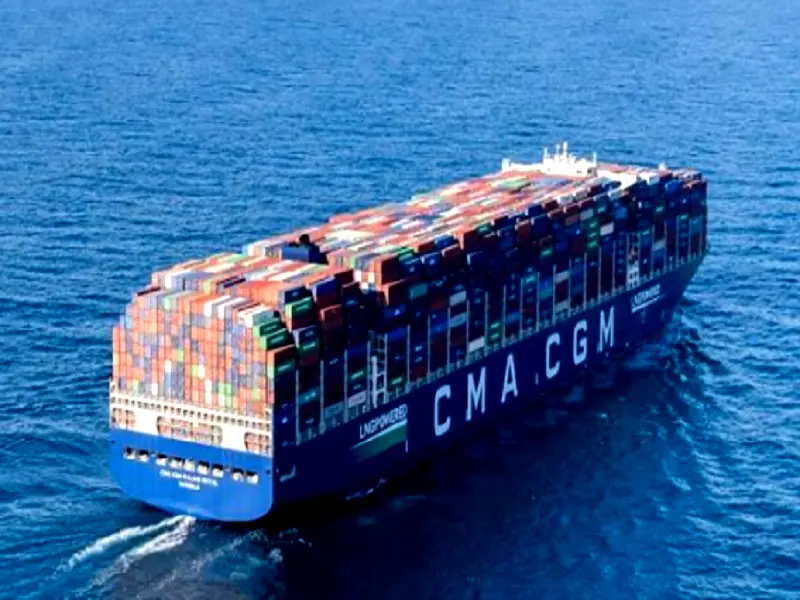
CMA CGM is a global shipping company that has established itself as a leader in the maritime industry. With a rich history and a wide range of services, CMA CGM has become synonymous with reliability, efficiency, and innovation. In this article, we will explore the journey of CMA CGM, its services, global presence, fleet and technology, sustainable practices, industry challenges, and future outlook.
History of CMA CGM
Founded in 1978 by Jacques R. Saadé, CMA CGM started as a small shipping company with only one ship. Over the years, it expanded its operations and rapidly grew into a global powerhouse. Today, CMA CGM operates a vast network of shipping routes, connecting major ports across the world. The company’s commitment to excellence and customer satisfaction has been instrumental in its success.
CMA CGM’s Services
CMA CGM offers a comprehensive range of services to meet the diverse needs of its customers. Whether it’s transporting goods by sea, land, or air, CMA CGM provides efficient and reliable solutions. The company offers container shipping, logistics services, and value-added solutions such as customs clearance and warehousing. CMA CGM’s services cater to a wide range of industries, including retail, automotive, pharmaceuticals, and more.
Global Presence
With its extensive global network, CMA CGM has a strong presence in all major trade lanes. The company operates in over 160 countries and serves more than 420 ports worldwide. Its well-connected network ensures seamless cargo transportation and enables businesses to reach markets across the globe. CMA CGM’s strategic partnerships and alliances further strengthen its global reach and enhance its service offerings.
Fleet and Technology
CMA CGM boasts a modern and diverse fleet of vessels equipped with advanced technologies. The company continuously invests in its fleet to ensure operational efficiency, safety, and environmental sustainability. CMA CGM’s vessels are equipped with state-of-the-art navigation systems, fuel-efficient engines, and eco-friendly features. The use of digital platforms and data analytics enhances the company’s operational capabilities, enabling efficient cargo tracking, supply chain management, and real-time information sharing.
Sustainable Practices
Recognizing the importance of environmental sustainability, CMA CGM is committed to reducing its carbon footprint and promoting eco-friendly practices. The company has implemented various initiatives, such as using cleaner fuels, optimizing vessel speed, and investing in energy-efficient technologies. CMA CGM also actively supports research and development of sustainable shipping solutions, aiming to create a greener and more sustainable maritime industry.
Industry Challenges
Like any industry, the maritime sector faces its fair share of challenges. CMA CGM, along with other shipping companies, encounters factors such as volatile fuel prices, geopolitical tensions, regulatory changes, and fluctuating global trade patterns. To navigate these challenges, CMA CGM focuses on adaptability, innovation, and collaboration with industry stakeholders.
Future Outlook
Looking ahead, CMA CGM aims to further strengthen its position as a global leader in the shipping industry. The company plans to continue expanding its services, investing in digitalization and automation, and exploring new opportunities in emerging markets. CMA CGM’s commitment to sustainable practices and customer-centricity will remain at the core of its business strategy, enabling it to adapt and thrive in a rapidly evolving global landscape.
2. Mediterranean Shipping Company
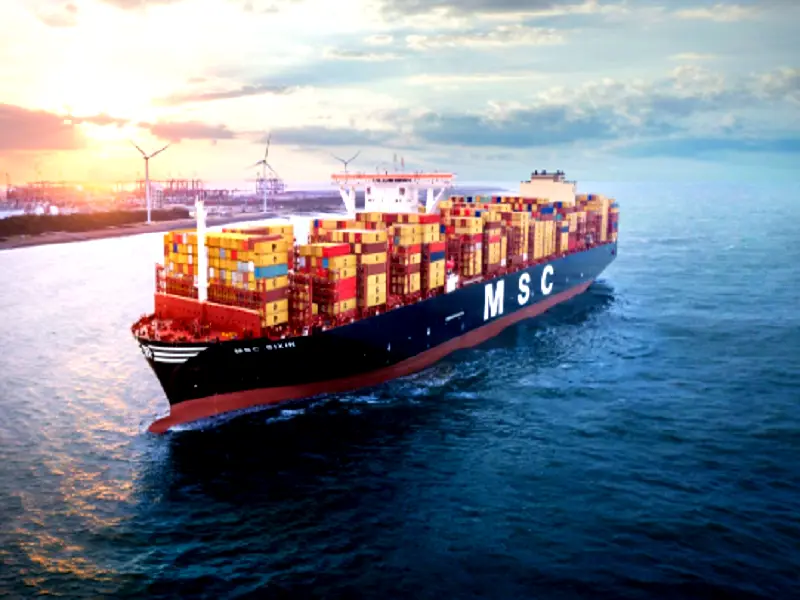
In the vast realm of global shipping, the Mediterranean Shipping Company (MSC) stands tall as a prominent player. With a rich history, a vast fleet, and a global presence, MSC has emerged as a leading container shipping company, offering a wide range of services to businesses worldwide. This article dives into the depths of MSC, exploring its history, services, environmental initiatives, customer satisfaction, and more.
Overview of Mediterranean Shipping Company
The Mediterranean Shipping Company, commonly known as MSC, was founded in 1970 by Gianluigi Aponte. It started as a small shipping agency in Naples, Italy, and has grown over the years to become one of the largest container shipping companies globally. With a strong emphasis on customer service, reliability, and efficiency, MSC has achieved remarkable success in the industry.
History and Background
MSC’s journey began with just a single vessel and a vision to connect businesses across the globe. Since its inception, MSC has experienced significant growth, expanding its operations to various parts of the world. The company’s commitment to innovation, investment in technology, and strategic partnerships have played a crucial role in its development. Today, MSC operates a vast fleet of container ships, serving thousands of ports worldwide.
Services and Fleet
MSC offers a comprehensive range of shipping services tailored to meet the diverse needs of businesses. Its extensive fleet comprises container vessels of various sizes, equipped with state-of-the-art technology to ensure the safe and efficient transport of goods. The company provides services such as full container load (FCL), less than container load (LCL), temperature-controlled transportation, and specialized cargo handling.
Global Presence
With a global network spanning over 200 routes and calling at more than 500 ports, MSC has established a formidable presence in the shipping industry. Its services cover major trade routes, connecting continents and facilitating international trade. MSC’s extensive network enables businesses to transport their goods efficiently and reliably to destinations around the world.
Technology and Innovation
In a rapidly evolving industry, MSC has embraced technology and innovation to enhance its services and streamline operations. The company has implemented advanced systems for tracking and monitoring cargo, providing real-time visibility to customers. Additionally, MSC leverages data analytics and artificial intelligence to optimize routing, reduce fuel consumption, and minimize environmental impact.
Environmental Initiatives
Recognizing the importance of environmental sustainability, MSC has taken significant steps to reduce its carbon footprint and promote eco-friendly practices. The company has invested in energy-efficient vessels, implemented fuel-saving measures, and adopted alternative fuels. MSC is actively involved in research and development, collaborating with industry partners to drive innovation and find greener solutions for the shipping industry.
Customer Satisfaction and Reviews
Customer satisfaction is at the core of MSC’s business philosophy. The company strives to provide exceptional service and maintain strong relationships with its customers. With a focus on reliability, on-time delivery, and efficient cargo handling, MSC has garnered positive reviews from businesses worldwide. Its commitment to meeting customer expectations has contributed to its reputation as a trusted shipping partner.
Competitive Advantage
MSC’s competitive advantage lies in its extensive global network, modern fleet, and commitment to customer service. The company’s wide range of services, flexibility in meeting customer demands, and strong presence in key markets give it a competitive edge. Furthermore, MSC’s emphasis on technological advancements and environmental initiatives positions it as an industry leader and sets it apart from its competitors.
Challenges and Future Prospects
Like any industry, the shipping sector faces its share of challenges. MSC, too, encounters obstacles such as fluctuating fuel prices, regulatory changes, and geopolitical factors that impact global trade. However, the company’s strategic planning, adaptability, and focus on innovation enable it to overcome challenges and seize opportunities. As the world continues to evolve, MSC is well-positioned to navigate the future of shipping.
3. Evergreen Marine Corp.
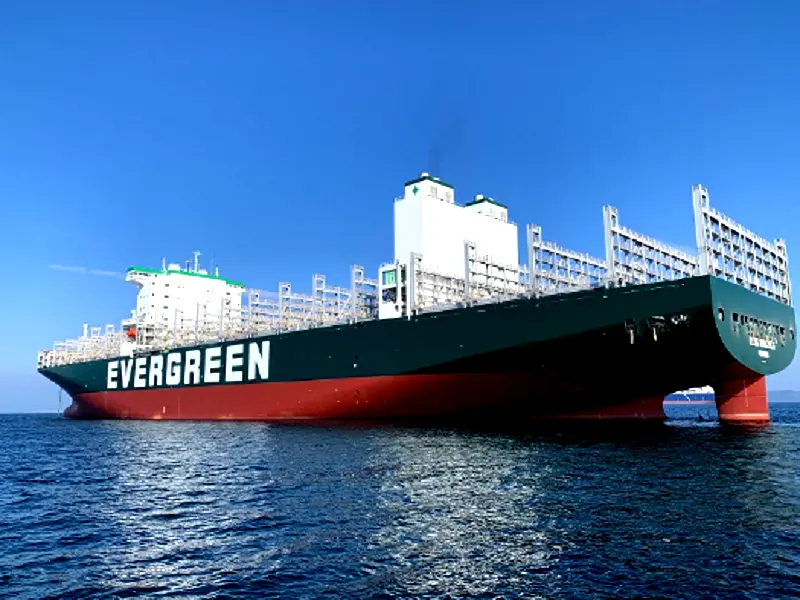
Evergreen Marine Corp, a prominent name in the maritime industry, has established itself as a leading global shipping company. With a rich history, impressive achievements, and a commitment to innovation, Evergreen Marine Corp has become a significant player in the shipping and logistics sector.
History of Evergreen Marine Corp
Evergreen Marine Corp was founded in 1968 by Dr. Yung-Fa Chang, a visionary entrepreneur. Starting with just one vessel, the company gradually expanded its fleet and services. Over the years, Evergreen Marine Corp has emerged as a major force in the shipping industry, continually adapting to meet the evolving needs of customers worldwide.
Key Achievements
Evergreen Marine Corp has achieved several notable milestones throughout its history. It was the first shipping line to introduce large-scale containerization in Taiwan. The company also played a crucial role in developing and expanding global shipping routes, connecting continents and facilitating international trade. Evergreen Marine Corp’s commitment to excellence has been recognized through numerous industry accolades and awards.
Fleet and Services
Evergreen Marine Corp boasts a modern and diverse fleet of container vessels, equipped with advanced technologies for efficient and secure transportation. The company offers a comprehensive range of services, including full-container-load (FCL), less-than-container-load (LCL), and specialized cargo handling. With a strong focus on reliability, Evergreen Marine Corp ensures timely delivery and exceptional customer satisfaction.
Global Presence
With a strong global presence, Evergreen Marine Corp operates in major ports and trade routes across the world. Its extensive network covers Asia, Europe, the Americas, the Middle East, and Africa. Through strategic partnerships and alliances, the company has established a robust logistics infrastructure to meet the growing demands of international trade.
Sustainability Initiatives
Evergreen Marine Corp recognizes the importance of environmental stewardship and sustainability. The company has implemented various initiatives to reduce its carbon footprint and promote eco-friendly practices. From investing in fuel-efficient vessels to adopting innovative technologies for emission reduction, Evergreen Marine Corp is committed to sustainable shipping operations.
Technological Innovations
Embracing digitalization and technological advancements, Evergreen Marine Corp has integrated cutting-edge solutions into its operations. The company utilizes advanced tracking systems, data analytics, and automation tools to enhance efficiency, improve supply chain visibility, and streamline customer interactions. Evergreen Marine Corp’s continuous investment in technology ensures it remains at the forefront of the industry.
Industry Partnerships
To stay ahead in a competitive market, Evergreen Marine Corp actively collaborates with various stakeholders in the maritime industry. By partnering with port authorities, terminal operators, and other shipping lines, the company strives to optimize services, streamline processes, and enhance customer experiences. These collaborations also facilitate innovation and knowledge sharing within the industry.
Market Position and Competition
Evergreen Marine Corp has established a strong market position, thanks to its global reach, reliable services, and customer-centric approach. However, the shipping industry is highly competitive, with several major players vying for market share. Evergreen Marine Corp faces competition from other leading shipping companies, each striving to offer superior services and attract customers in a dynamic and evolving market.
Future Outlook
Looking ahead, Evergreen Marine Corp remains committed to growth and innovation. The company plans to further expand its fleet, enhance operational efficiency, and explore emerging markets. With a focus on sustainability and customer satisfaction, Evergreen Marine Corp aims to solidify its position as a trusted and preferred shipping partner for businesses worldwide.
4. Hapag-Lloyd
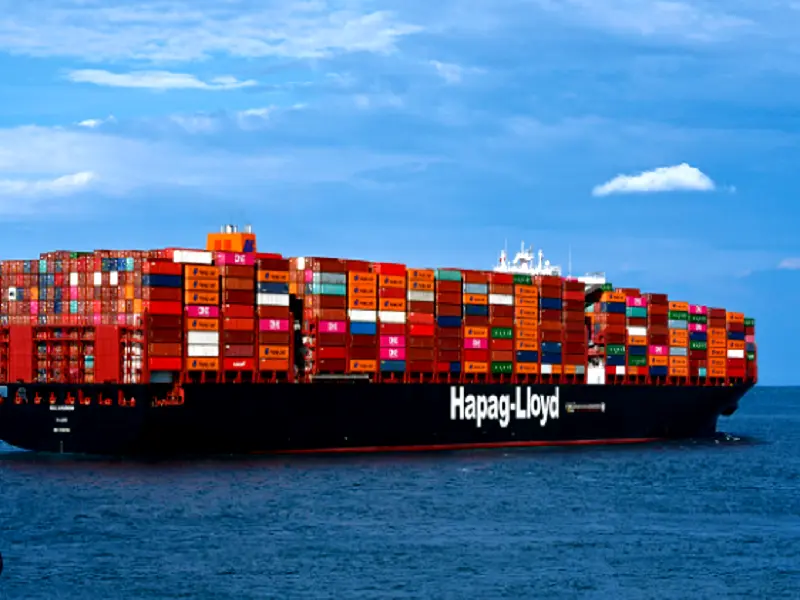
In today’s interconnected world, the efficient and reliable transportation of goods across the globe is paramount. One company that has consistently excelled in this domain is Hapag-Lloyd. With a rich history, a commitment to sustainability, and a customer-centric approach, Hapag-Lloyd has emerged as a leader in the container shipping industry. In this article, we will explore the journey of Hapag-Lloyd, its services, market position, sustainability initiatives, and future prospects.
Introduction to Hapag-Lloyd
Hapag-Lloyd is a prominent global container shipping company that provides comprehensive logistics solutions to businesses worldwide. With its headquarters in Hamburg, Germany, Hapag-Lloyd operates a vast network that connects more than 600 ports in over 130 countries. The company’s commitment to excellence, combined with its extensive industry experience, has established Hapag-Lloyd as a trusted partner for businesses seeking reliable and efficient transportation solutions.
History and Background
Early Years
Hapag-Lloyd traces its origins back to the 19th century when two German shipping companies, Hamburg-Amerikanische Packetfahrt-Actien-Gesellschaft (HAPAG) and Norddeutscher Lloyd (NDL), were founded. These companies played significant roles in facilitating transatlantic passenger and cargo transportation, contributing to Germany’s maritime heritage.
Merger and Expansion
In 1970, HAPAG and NDL merged to form Hapag-Lloyd, combining their resources and expertise to strengthen their position in the shipping industry. Over the years, Hapag-Lloyd embarked on a journey of expansion, acquiring and merging with various companies to enhance its global reach and service offerings. Today, the company is recognized as one of the largest container shipping lines in the world.
Current Status
With a fleet of modern and technologically advanced vessels, Hapag-Lloyd operates on major trade routes and serves a diverse range of industries, including automotive, chemicals, electronics, and retail. The company has positioned itself as a reliable partner for global trade, offering end-to-end logistics solutions that encompass container shipping, terminal services, and inland transportation.
Hapag-Lloyd’s Services and Operations
Container Shipping
As a major player in the container shipping industry, Hapag-Lloyd provides efficient and secure transportation of goods across the globe. The company offers a wide range of container types and sizes to accommodate various cargo requirements. From standard dry containers to specialized refrigerated containers for perishable goods, Hapag-Lloyd ensures the safe and timely delivery of diverse cargo types.
Fleet and Network
Hapag-Lloyd maintains a modern and eco-friendly fleet of vessels equipped with advanced technologies to optimize operational efficiency and reduce environmental impact. The company’s extensive network of shipping routes connects key ports worldwide, enabling seamless connections and ensuring timely delivery. Hapag-Lloyd’s focus on maintaining reliable schedules and providing efficient transit times has earned it a strong reputation in the industry.
Technology and Innovation
Embracing digital transformation, Hapag-Lloyd leverages technology and innovation to enhance its services. The company has implemented state-of-the-art systems for cargo tracking, documentation, and online booking, empowering customers with real-time visibility and simplified processes. Hapag-Lloyd’s commitment to technological advancements positions it at the forefront of the digital revolution in the shipping industry.
Sustainability and Environmental Initiatives
Emission Reduction
Acknowledging the environmental impact of the shipping industry, Hapag-Lloyd is actively working to reduce its carbon footprint. The company has set ambitious targets to decrease greenhouse gas emissions through various measures, including vessel optimization, fuel efficiency enhancements, and operational improvements. By investing in fuel-efficient vessels and optimizing routes, Hapag-Lloyd strives to contribute to a greener and more sustainable future.
Alternative Fuels
In addition to emission reduction efforts, Hapag-Lloyd is exploring alternative fuels as a means to further minimize its environmental impact. The company is actively engaged in research and development initiatives focused on utilizing low-carbon or carbon-neutral fuels, such as liquefied natural gas (LNG) and biofuels. By embracing these sustainable alternatives, Hapag-Lloyd aims to lead the industry’s transition to cleaner energy sources.
Eco-Friendly Practices
Hapag-Lloyd promotes eco-friendly practices throughout its operations. This includes waste management programs, ballast water treatment to prevent the spread of invasive species, and measures to reduce noise pollution. The company actively complies with international environmental regulations and collaborates with industry stakeholders to drive sustainable practices across the entire supply chain.
Hapag-Lloyd’s Market Position and Competitors
Global Presence
Hapag-Lloyd’s global presence and extensive network of services have positioned it as a key player in the container shipping industry. The company’s strong market presence is reinforced by its strategic alliances and partnerships with other shipping lines, enabling it to offer comprehensive coverage and competitive services across major trade lanes.
Competitor Analysis
As a global industry, container shipping is highly competitive, with several players vying for market share. Hapag-Lloyd faces competition from other major shipping lines, including Maersk Line, MSC, CMA CGM, and COSCO Shipping. These competitors, each with their strengths and strategies, contribute to a dynamic and evolving landscape in which Hapag-Lloyd continuously strives to differentiate itself through superior service and operational excellence.
Customer-Centric Approach and Service Excellence
Hapag-Lloyd places great emphasis on customer satisfaction and aims to provide a seamless and reliable shipping experience. The company’s customer-centric approach is reflected in its responsive and personalized services. Hapag-Lloyd values its relationships with customers and strives to understand their unique requirements, offering tailored solutions and value-added services to optimize their supply chains.
Future Outlook and Growth Strategies
Digital Transformation
To remain at the forefront of the industry, Hapag-Lloyd recognizes the importance of digitalization. The company continues to invest in digital technologies and platforms that enhance operational efficiency, customer experience, and supply chain visibility. By leveraging data analytics, artificial intelligence, and automation, Hapag-Lloyd aims to drive innovation and provide even more efficient and transparent services in the future.
Expansion Plans
Hapag-Lloyd has ambitious expansion plans to further strengthen its global footprint. The company seeks opportunities to enter new markets and expand its service offerings. By continually evaluating market trends and customer needs, Hapag-Lloyd aims to identify strategic growth opportunities and establish itself as a preferred partner for businesses worldwide.
Industry Trends
The container shipping industry is experiencing rapid evolution driven by changing market dynamics and technological advancements. Hapag-Lloyd closely monitors industry trends, such as the rise of e-commerce, the increasing focus on sustainability, and the impact of geopolitical factors on global trade. By staying abreast of these trends and proactively adapting its strategies, Hapag-Lloyd aims to stay ahead of the curve and effectively navigate the ever-changing industry landscape.
5. Maersk Line
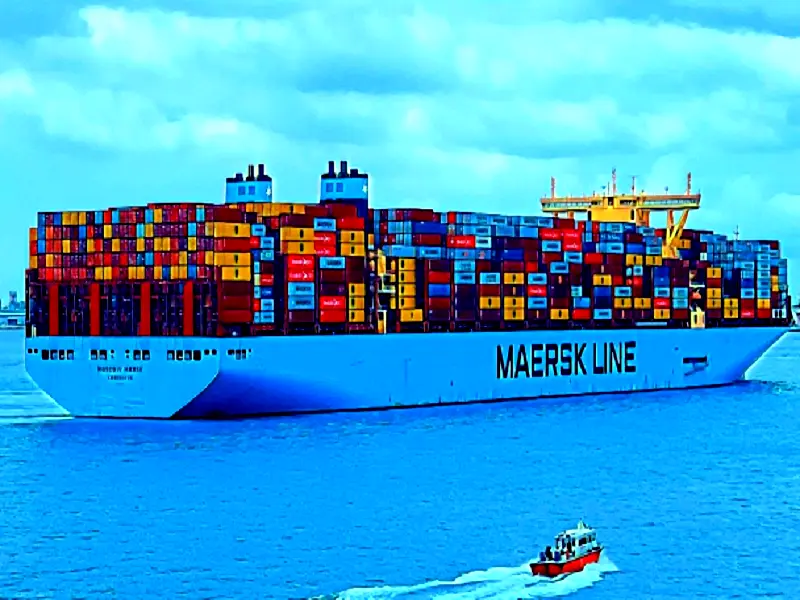
Maersk Line, a division of the Maersk Group, is one of the world’s largest container shipping companies. With a rich history dating back several decades, Maersk Line has established itself as a leader in the maritime industry. Through its extensive network, technological innovations, and customer-centric approach, Maersk Line has played a vital role in facilitating global trade and connecting businesses across continents.
I. Introduction
Maersk Line has a strong reputation for its reliable and efficient container shipping services, catering to the needs of diverse industries and customers worldwide. The company’s commitment to innovation, sustainability, and customer satisfaction has propelled it to the forefront of the global shipping industry.
II. History of Maersk Line
Establishment and Early Years
Maersk Line was founded in 1928 by Arnold Peter Møller as a small shipping company based in Denmark. Initially focusing on trade routes between Europe and the Far East, the company steadily expanded its fleet and services.
Expansion and Acquisitions
Over the years, Maersk Line embarked on a journey of growth through strategic acquisitions and partnerships. Notable milestones include the acquisition of Sea-Land Service in 1999, which significantly expanded Maersk Line’s presence in the Americas. The company’s global footprint continued to expand through the integration of various shipping lines and terminal operators.
III. Services and Network
Global Reach
With a vast network spanning over 130 countries, Maersk Line offers comprehensive coverage and connectivity across major trade lanes. Its extensive fleet of container vessels ensures a reliable and efficient transportation service for businesses worldwide.
Container Shipping Services
Maersk Line’s core offering lies in container shipping services, allowing customers to transport goods securely and efficiently. The company provides a range of container types and sizes to accommodate various cargo requirements.
Specialized Services
In addition to standard container shipping, Maersk Line offers specialized services tailored to specific industries and cargo types. These services include refrigerated transportation (reefer), oversized cargo shipping, and secure transport of high-value goods.
IV. Technological Innovations
Digitalization and Automation
Maersk Line is at the forefront of digital transformation in the shipping industry. By embracing technology and automation, the company has streamlined operations, enhanced supply chain visibility, and improved customer experience. Digital platforms and tools allow customers to track shipments, manage documentation, and optimize logistics processes.
Sustainability Initiatives
Recognizing the importance of sustainability, Maersk Line has implemented various initiatives to reduce its environmental footprint. This includes the adoption of cleaner fuels, optimization of vessel routes, and investments in energy-efficient technologies. The company aims to become carbon-neutral by 2050, contributing to a greener and more sustainable maritime industry.
V. Customer Focus and Satisfaction
Customer-Centric Approach
Maersk Line places a strong emphasis on understanding and meeting the unique needs of its customers. Through close collaboration and a dedicated customer service team, the company ensures personalized solutions and reliable support throughout the shipping process. Maersk Line’s commitment to customer satisfaction has earned it a reputation for service excellence.
Service Quality and Reliability
One of Maersk Line’s key strengths is its commitment to maintaining service quality and reliability. By investing in a modern fleet, adhering to stringent safety standards, and optimizing operational processes, the company ensures timely delivery and minimized disruptions for customers. Maersk Line’s focus on reliability has helped build long-term partnerships with businesses around the world.
VI. Maersk Line’s Contribution to Global Trade
Facilitating International Trade
As a global container shipping leader, Maersk Line plays a critical role in facilitating international trade. The company’s services connect manufacturers, retailers, and consumers across continents, enabling the smooth flow of goods and materials. Maersk Line’s extensive network and expertise contribute to the growth and development of global supply chains.
Impact on Supply Chains
Maersk Line’s reliable and efficient shipping services have a significant impact on supply chains worldwide. By providing timely transportation solutions, the company helps businesses optimize inventory management, reduce lead times, and meet customer demands. Maersk Line’s expertise in logistics and global trade enables companies to expand their reach and access new markets.
VII. Challenges and Competition
Market Challenges
The shipping industry faces various challenges, including volatile fuel prices, regulatory changes, geopolitical factors, and economic fluctuations. Maersk Line operates in a highly competitive market, where pricing, service quality, and operational efficiency are key differentiators. The company continuously adapts to market dynamics and invests in innovation to maintain its competitive edge.
Competitors in the Industry
Maersk Line faces competition from other major container shipping companies, including Mediterranean Shipping Company (MSC), CMA CGM, and COSCO Shipping Lines. These competitors vie for market share by offering similar services and expanding their global networks. However, Maersk Line’s longstanding presence, customer-centric approach, and technological advancements give it a strong competitive advantage.
VIII. Future Outlook and Growth Prospects
Industry Trends and Opportunities
The shipping industry continues to evolve rapidly, driven by technological advancements, changing customer expectations, and sustainability imperatives. Maersk Line is well-positioned to capitalize on emerging opportunities, such as e-commerce growth, digitalization, and the demand for sustainable shipping solutions. By leveraging its expertise, network, and customer relationships, Maersk Line aims to drive future growth and innovation.
Maersk Line’s Strategies for Growth
To sustain its leadership position, Maersk Line focuses on a combination of organic growth and strategic acquisitions. The company invests in new vessels, digital technologies, and infrastructure development to enhance its capabilities. Additionally, Maersk Line fosters collaborations with industry stakeholders and actively explores partnerships that enable it to expand its service offerings and geographic reach.
6. DHL

Logistics and shipping play a crucial role in today’s interconnected world, facilitating the movement of goods and connecting businesses and consumers across continents. One prominent player in this industry is DHL, a global leader known for its efficient and reliable services. In this article, we will explore the fascinating world of DHL, its history, services, global network, commitment to sustainability, technological advancements, customer satisfaction, and its impact on the e-commerce industry. So, let’s dive in and discover the essence of DHL.
I. Introduction
What is DHL?
DHL is a world-renowned logistics and shipping company that provides a wide range of services to individuals and businesses. With a strong emphasis on efficiency, reliability, and customer satisfaction, DHL has established itself as a trusted brand in the global transportation industry.
Importance of logistics and shipping services
In today’s interconnected world, the smooth movement of goods and packages is vital for businesses and individuals alike. Logistics and shipping services ensure that products reach their intended destinations safely and on time, enabling trade, fostering economic growth, and satisfying consumer demand.
II. History of DHL
Founding and early years
DHL traces its roots back to 1969 when three entrepreneurs, Adrian Dalsey, Larry Hillblom, and Robert Lynn, established the company in San Francisco, California. The trio revolutionized the shipping industry by introducing a new concept called “express delivery,” which offered faster and more reliable shipping options than traditional methods.
Expansion and globalization
After its initial success, DHL expanded its operations rapidly and became the first international air express company. By the 1980s, DHL had established a strong global presence, connecting major cities around the world and providing innovative shipping solutions. Today, DHL operates in over 220 countries and territories, employing a vast network of dedicated professionals.
III. Services offered by DHL
Express delivery services
DHL offers a comprehensive range of express delivery services tailored to meet various needs. Whether it’s urgent documents, time-sensitive shipments, or high-value goods, DHL ensures speedy and secure delivery through its extensive network of air, ocean, and road transportation.
Freight transportation
In addition to express delivery, DHL specializes in freight transportation services, catering to businesses with larger and bulkier shipments. DHL’s freight services include air, ocean, and road freight, providing flexible and efficient solutions for transporting goods across different regions and continents.
E-commerce solutions
Recognizing the rapid growth of the e-commerce industry, DHL offers specialized solutions to facilitate seamless online trade. From fulfillment services and warehousing to last-mile delivery and returns management, DHL supports e-commerce businesses in managing their supply chains efficiently.
IV. DHL’s global network
Worldwide presence
DHL has built an extensive global network, connecting major cities, remote locations, and emerging markets. With strategically located hubs, warehouses, and service centers, DHL ensures that shipments can reach even the most remote corners of the world with speed and efficiency.
International partnerships and acquisitions
To further strengthen its global presence and enhance its service offerings, DHL has forged strategic partnerships and acquired companies worldwide. By collaborating with local logistics providers, DHL leverages their expertise and resources to deliver tailored solutions that meet the unique requirements of different markets.
V. DHL’s commitment to sustainability
Green initiatives
DHL is committed to minimizing its environmental footprint and actively promotes sustainable practices across its operations. From optimizing transportation routes to reducing emissions and implementing energy-efficient technologies, DHL strives to contribute to a greener future.
Environmental impact reduction
Recognizing the impact of its operations on the environment, DHL invests in innovative solutions to reduce its carbon footprint. By utilizing alternative fuels, electric vehicles, and renewable energy sources, DHL aims to minimize greenhouse gas emissions and promote eco-friendly transportation.
VI. DHL’s technology and innovation
Advanced tracking systems
DHL employs state-of-the-art tracking systems that provide real-time visibility of shipments throughout the delivery process. Customers can track their packages online, receive timely updates, and have peace of mind knowing the exact location and estimated arrival time of their shipments.
Automated warehouses and drones
To enhance operational efficiency, DHL incorporates automation and robotics in its warehouses. Automated sorting systems, smart inventory management, and autonomous drones enable faster order processing, reduce errors, and optimize the overall supply chain.
VII. Customer satisfaction and reliability
Efficient and timely delivery
DHL places a strong emphasis on delivering packages promptly and reliably. Through meticulous planning, advanced logistics capabilities, and a dedicated workforce, DHL ensures that shipments are delivered within the promised time frame, meeting and exceeding customer expectations.
Customer support and feedback
DHL prioritizes customer satisfaction by providing excellent support services. Whether it’s tracking assistance, shipment inquiries, or addressing concerns, DHL’s customer support team is readily available to assist customers and resolve any issues promptly. Customer feedback is highly valued, as it helps DHL continually improve its services and meet evolving customer needs.
VIII. DHL in the e-commerce industry
Facilitating global online trade
With the rise of e-commerce, DHL plays a pivotal role in enabling global online trade. By offering seamless cross-border logistics solutions, DHL helps businesses expand their reach, connect with international customers, and deliver products efficiently, contributing to the growth of the e-commerce industry.
Streamlining supply chains
DHL’s e-commerce solutions go beyond transportation and encompass end-to-end supply chain management. From inventory management and order fulfillment to reverse logistics, DHL streamlines the entire process, enabling businesses to focus on their core competencies while leaving the complexities of logistics in expert hands.
IX. DHL’s corporate social responsibility
Philanthropic initiatives
DHL actively engages in philanthropic activities and community development projects. Through initiatives like disaster response, education programs, and healthcare support, DHL strives to make a positive impact on society and contribute to the well-being of communities worldwide.
Employee welfare and diversity
DHL values its employees and promotes a culture of diversity and inclusion. With a workforce comprising individuals from different backgrounds and cultures, DHL fosters an environment of respect, equal opportunity, and professional growth, ensuring employee satisfaction and overall organizational success.
7. Maersk
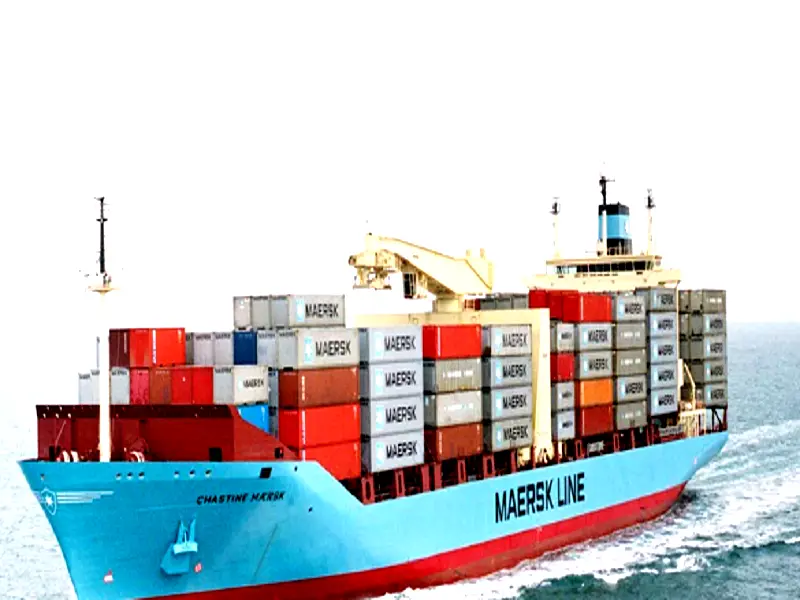
Maersk, a Danish multinational conglomerate, has emerged as a global leader in shipping, logistics, and energy industries. With a rich history spanning over a century, Maersk has transformed the way goods are transported, contributing significantly to the growth of global trade. This article explores the fascinating journey of Maersk, its core business areas, technological innovations, global presence, and its impact on the world economy.
History and Background
Maersk traces its roots back to 1904 when it was established as a shipping company by A.P. Møller and his father-in-law, Captain Peter Mærsk-Møller. Initially focused on connecting Europe with the Far East, Maersk steadily expanded its operations and diversified into various sectors, including oil and gas exploration, retail, and manufacturing. Over the years, it has become synonymous with reliability, efficiency, and innovation in the maritime industry.
Maersk’s Core Business Areas
Maersk operates in three primary business areas, each contributing to its global prominence:
1. Shipping and Logistics Under this segment, Maersk operates one of the world’s largest container shipping fleets, facilitating the movement of goods across continents. Its extensive network connects more than 130 countries, with a focus on reliable delivery, optimal routing, and efficient port operations. Maersk also provides end-to-end logistics solutions, encompassing customs clearance, warehousing, and supply chain management.
2. Oil and Gas Exploration Maersk ventured into the oil and gas industry in the 1960s and has since played a significant role in offshore exploration and production. With a portfolio of exploration licenses and production assets across various regions, Maersk has established itself as a key player in the energy sector. It leverages advanced technologies and expertise to unlock energy resources while prioritizing safety and environmental sustainability.
3. Retail and Manufacturing Recognizing the importance of integrating the supply chain, Maersk expanded into the retail and manufacturing sector. Through its subsidiary, Maersk Container Industry (MCI), the company manufactures refrigerated containers, supporting the transportation of perishable goods. This vertical integration enables Maersk to offer comprehensive solutions to its customers and enhance operational efficiencies.
Maersk’s Global Presence
Maersk’s global presence is a testament to its expansive reach and operational excellence.
4.1 Operations and Fleet With a diverse fleet of container ships, tankers, and drilling rigs, Maersk operates in major shipping lanes worldwide. Its vessels are equipped with advanced technologies and adhere to stringent safety and environmental standards. The company’s extensive operational infrastructure includes strategically located ports, terminals, and logistics hubs, facilitating seamless connectivity and efficient cargo handling.
4.2 Market Share Maersk’s dominance in the shipping industry is reflected in its significant market share. It consistently ranks among the top players globally, benefiting from economies of scale, robust customer relationships, and a reputation for reliable services. Maersk’s market leadership allows it to influence industry trends and set new standards for efficiency and sustainability.
Technological Innovations by Maersk
Maersk has been at the forefront of digital transformation and technological innovation in the maritime and logistics sectors.
5.1 Digitalization and Data Analytics Recognizing the power of data, Maersk has invested heavily in digitalization and data analytics. By harnessing real-time data from its operations, the company optimizes routes, predicts demand, and minimizes delays, resulting in cost savings and enhanced customer satisfaction. Maersk’s digital platforms offer customers end-to-end visibility and control over their shipments, streamlining the supply chain.
5.2 Blockchain and Supply Chain Transparency In collaboration with industry partners, Maersk has pioneered the use of blockchain technology to enhance supply chain transparency and security. Through platforms like TradeLens, it enables stakeholders to track and verify the flow of goods, reducing paperwork, improving customs clearance processes, and combating counterfeit products. Maersk’s commitment to transparency and integrity fosters trust among its customers and partners.
5.3 Sustainability Initiatives As sustainability becomes increasingly important, Maersk has undertaken several initiatives to reduce its environmental impact. It aims to achieve carbon neutrality by 2050, focusing on fuel efficiency, alternative fuels, and investments in renewable energy. Maersk’s commitment to sustainability aligns with the United Nations’ Sustainable Development Goals, promoting a greener and more sustainable future for global trade.
Maersk’s Impact on Global Trade
Maersk’s relentless pursuit of efficiency and innovation has had a profound impact on global trade dynamics.
6.1 Efficiency and Cost Savings By optimizing routes, deploying larger vessels, and leveraging economies of scale, Maersk has significantly reduced shipping costs and transit times. This efficiency translates into tangible benefits for businesses and consumers, enabling the global economy to thrive. Maersk’s focus on continuous improvement and operational excellence has set new benchmarks in the industry.
6.2 Environmental Considerations Maersk recognizes the need to balance economic growth with environmental stewardship. Its investments in eco-friendly technologies and sustainable practices have reduced emissions, minimized waste, and preserved marine ecosystems. Through its initiatives, Maersk sets an example for the industry, encouraging others to adopt greener practices and contribute to the preservation of our planet.
6.3 Market Competitiveness The success of Maersk has stimulated competition and encouraged other players in the industry to innovate and enhance their services. The introduction of new technologies, streamlined operations, and increased transparency have improved overall market competitiveness, benefiting businesses and consumers alike.
Challenges and Future Outlook
While Maersk enjoys a strong market position, it faces several challenges and opportunities for future growth.
7.1 Industry Disruptions and Competition The shipping and logistics industry is susceptible to disruptions, such as geopolitical tensions, economic fluctuations, and regulatory changes. Additionally, the emergence of digital freight platforms and new entrants pose competitive challenges to traditional players like Maersk. To maintain its leadership position, Maersk must continuously adapt to evolving market dynamics and embrace innovation.
7.2 Diversification and Growth Strategies To mitigate risks and explore new revenue streams, Maersk is pursuing diversification strategies. This includes expanding into adjacent industries, investing in startups and digital platforms, and exploring emerging markets. By leveraging its core competencies and embracing strategic partnerships, Maersk aims to unlock new growth opportunities and remain at the forefront of industry transformation.
8. Yang Ming Marine Transport Corporation
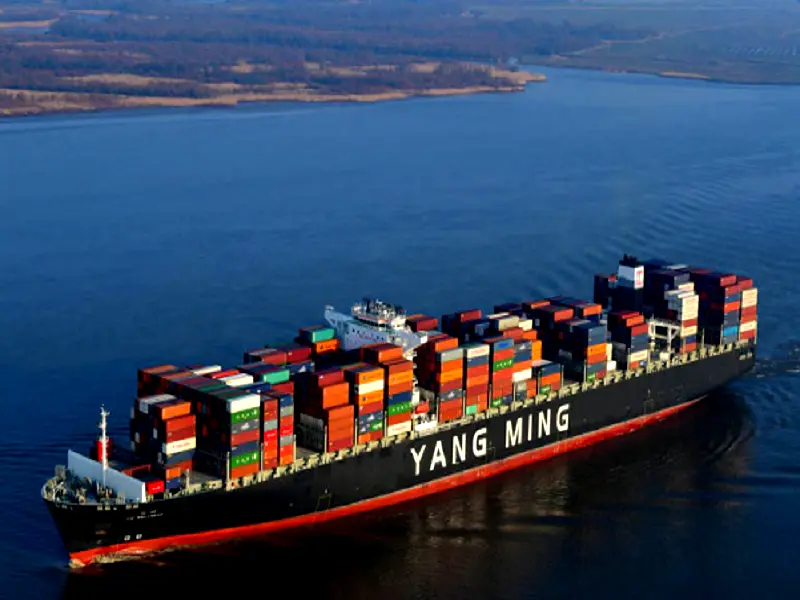
Yang Ming Marine Transport Corporation is a global shipping company based in Taiwan. With a rich history spanning several decades, Yang Ming has established itself as a prominent player in the maritime industry. This article will delve into the company’s background, its fleet and services, global network, environmental initiatives, technological advancements, collaborations, competitive advantage, financial performance, and future prospects.
History and Background of Yang Ming
Established in 1972, Yang Ming Marine Transport Corporation has a strong foundation built on years of experience and expertise. It was initially founded as a joint venture between the Ministry of Communications and Ministry of Economic Affairs in Taiwan. Since its inception, Yang Ming has steadily grown its operations and emerged as a key player in the container shipping industry.
Yang Ming’s Fleet and Services
Yang Ming boasts a modern and diverse fleet of container vessels, enabling it to cater to the growing demands of international trade. The company operates a wide range of container ship sizes, including ultra-large vessels capable of carrying thousands of TEUs (Twenty-foot Equivalent Units). This extensive fleet allows Yang Ming to offer a comprehensive suite of services, including containerized cargo transportation, logistics solutions, and value-added services.
Global Network and Trade Routes
With a strong presence in major trade lanes worldwide, Yang Ming has developed an extensive global network. The company serves more than 70 countries and operates in various strategic ports, facilitating efficient and reliable cargo transportation. Yang Ming’s trade routes cover Asia, Europe, North America, South America, and the Middle East, connecting key markets and enabling seamless international trade.
Environmental Initiatives and Sustainability Efforts
Recognizing the importance of sustainability in the maritime industry, Yang Ming is committed to minimizing its environmental footprint. The company has implemented various initiatives to reduce greenhouse gas emissions, optimize vessel fuel efficiency, and promote eco-friendly practices. Yang Ming actively invests in advanced technologies and eco-friendly vessel designs, aiming to achieve a greener and more sustainable shipping industry.
Technology and Innovation in Yang Ming
As a forward-thinking company, Yang Ming embraces technological advancements to enhance its operations and services. The company leverages cutting-edge solutions to optimize vessel performance, streamline logistics processes, and improve overall efficiency. Through the integration of digital platforms, data analytics, and automation, Yang Ming continuously innovates and adapts to meet the evolving needs of its customers.
Collaborations and Alliances
To further strengthen its position in the market, Yang Ming has formed strategic alliances and collaborations with other shipping companies. These partnerships enable Yang Ming to expand its service offerings, enhance network coverage, and provide customers with a wider range of options. Collaborations also promote resource sharing, knowledge exchange, and operational synergies, ultimately benefiting both the company and its customers.
Competitive Advantage and Market Position
In a highly competitive industry, Yang Ming has carved out a strong market position through its customer-centric approach and operational excellence. The company’s commitment to delivering reliable services, efficient operations, and innovative solutions has earned it a loyal customer base. Yang Ming’s focus on maintaining a competitive edge, combined with its global network and strong financial foundation, contributes to its success in the shipping industry.
Financial Performance and Growth
Yang Ming’s financial performance is a testament to its resilience and strategic management. The company has achieved consistent growth and profitability over the years, despite market fluctuations and economic challenges. Through effective cost management, strategic investments, and prudent financial planning, Yang Ming has positioned itself as a financially stable and robust organization.
Challenges and Future Outlook
While Yang Ming has achieved significant success, it faces challenges inherent in the shipping industry. Fluctuating fuel prices, regulatory changes, geopolitical uncertainties, and technological disruptions pose ongoing challenges. However, the company remains agile and adaptable, leveraging its strengths to overcome obstacles and seize opportunities. With a focus on innovation, sustainability, and customer satisfaction, Yang Ming is well-positioned for future growth and continued success.
9.China Ocean Shipping (Group) Company
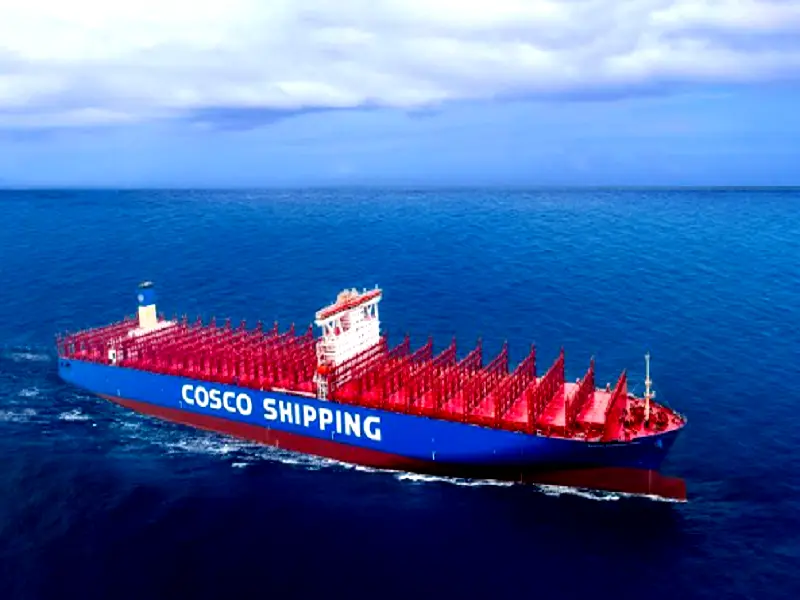
China Ocean Shipping (Group) Company, commonly known as COSCO, is one of the world’s leading shipping and logistics companies. With a rich history and global presence, COSCO has established itself as a key player in the maritime industry. This article provides a comprehensive overview of COSCO, its operations, global reach, fleet, contributions to global trade, challenges and opportunities, corporate social responsibility efforts, and more.
Introduction to China Ocean Shipping (Group) Company (COSCO)
Founded in 1961, China Ocean Shipping (Group) Company is a state-owned enterprise headquartered in Beijing, China. Over the years, COSCO has evolved into a multinational conglomerate with diverse business interests in shipping, logistics, terminal operations, and more. With its extensive fleet and infrastructure, COSCO plays a vital role in facilitating global trade and connecting businesses across continents.
COSCO’s Business Operations
COSCO offers a wide range of services to meet the shipping and logistics needs of its customers. Its core business operations include container shipping services, bulk cargo transportation, terminal operations, and logistics and supply chain services. By leveraging its expertise and resources, COSCO provides efficient and reliable solutions to businesses involved in international trade.
Container shipping services form a significant part of COSCO’s operations. The company operates a vast network of container vessels, connecting major ports worldwide. It offers comprehensive end-to-end solutions for cargo transportation, ensuring timely delivery and secure handling of goods. COSCO’s container shipping services cater to various industries, including manufacturing, retail, automotive, and more.
In addition to container shipping, COSCO specializes in bulk cargo transportation. Its fleet of bulk carriers enables the efficient transportation of commodities such as coal, iron ore, grain, and oil. With its extensive experience and expertise in bulk cargo logistics, COSCO has built strong relationships with key industry players and has a robust presence in the global bulk shipping market.
COSCO is also actively involved in terminal operations. The company owns and operates a significant number of terminals and port facilities across the world. These strategically located terminals serve as crucial hubs for transshipment, providing seamless connectivity between different regions. COSCO’s terminal operations ensure efficient cargo handling, storage, and distribution, contributing to the smooth flow of global trade.
Furthermore, COSCO offers comprehensive logistics and supply chain services. It provides end-to-end solutions, including freight forwarding, warehousing, customs clearance, and distribution. By integrating its shipping capabilities with logistics services, COSCO offers a seamless experience to its customers, optimizing their supply chains and enhancing overall efficiency.
Global Presence of COSCO
COSCO has achieved remarkable global expansion, establishing a significant presence in international markets. The company operates on major shipping routes worldwide, connecting various regions across Asia, Europe, the Americas, and Africa. COSCO’s extensive network of services covers a vast number of ports and destinations, enabling efficient trade flows between different countries.
Through strategic partnerships and alliances, COSCO has further strengthened its global presence. Collaborations with other shipping companies and logistics providers have facilitated enhanced service offerings, expanded market reach, and improved operational efficiency. These partnerships also foster innovation and knowledge-sharing within the industry, promoting sustainable growth.
COSCO’s Fleet and Infrastructure
COSCO boasts an impressive fleet of vessels that cater to different cargo requirements. Its fleet includes container ships, bulk carriers, specialized vessels, and more. The company maintains a diverse and modern fleet, incorporating the latest technological advancements to ensure operational excellence and environmental sustainability.
Investment in port facilities and terminals is another key aspect of COSCO’s infrastructure development. By acquiring and developing port assets worldwide, COSCO enhances its operational capabilities and strengthens its position as a global shipping and logistics leader. These investments contribute to the efficient handling of cargo and provide seamless connections between land and sea transportation networks.
COSCO is committed to adopting environmentally friendly practices and technologies. It actively invests in eco-friendly vessels, including those powered by liquefied natural gas (LNG) and other sustainable fuels. Furthermore, the company implements measures to reduce greenhouse gas emissions, optimize fuel consumption, and minimize the environmental impact of its operations.
COSCO’s Contribution to Global Trade
As a major player in the shipping industry, COSCO plays a crucial role in facilitating global trade. Its reliable and efficient transportation services enable businesses to connect with customers and suppliers across different continents. By providing seamless connectivity and timely delivery of goods, COSCO contributes to the growth and expansion of international trade.
COSCO’s integration with the Belt and Road Initiative (BRI) has further enhanced its role in global trade. The BRI aims to improve connectivity and promote economic cooperation among countries along the land and maritime Silk Road routes. COSCO’s extensive network aligns with the objectives of the BRI, fostering trade relationships and enabling economic development across multiple regions.
Challenges and Opportunities
Like any industry, the shipping sector faces its fair share of challenges and opportunities. COSCO operates in a highly competitive market, facing regulatory and geopolitical challenges that can impact its operations. Changing trade policies, tariffs, and economic uncertainties pose risks to the industry. However, COSCO continues to adapt and navigate these challenges, leveraging its strengths and seizing opportunities for growth.
The evolving landscape of international trade presents new opportunities for COSCO. Emerging trends, such as e-commerce, digitalization, and automation, are reshaping the logistics industry. COSCO embraces these technological advancements, exploring innovative solutions and digital platforms to enhance its services and improve operational efficiency. By staying at the forefront of industry trends, COSCO positions itself for continued success in a dynamic market.
Corporate Social Responsibility and Sustainability Efforts
COSCO recognizes the importance of corporate social responsibility and actively engages in sustainable practices. The company is committed to reducing its carbon footprint and promoting environmental conservation. It implements measures to improve energy efficiency, reduce emissions, and minimize the ecological impact of its operations.
Through various initiatives, COSCO contributes to social welfare and community development. It supports educational programs, healthcare initiatives, and disaster relief efforts in communities where it operates. COSCO’s commitment to social responsibility extends beyond its business operations, positively impacting the lives of people and fostering sustainable development.
10. Pacific International Lines
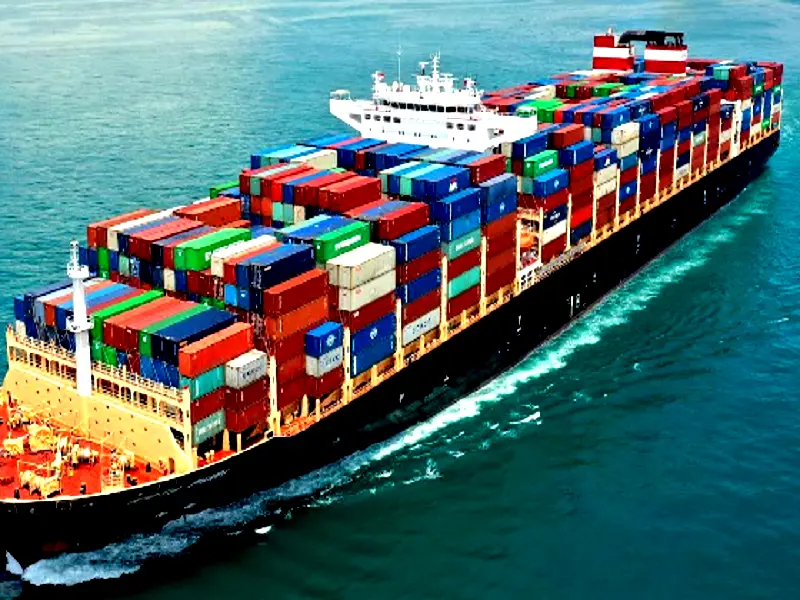
Pacific International Lines (PIL) stands tall as a leading global shipping and logistics company, providing comprehensive solutions to businesses involved in international trade. With a rich history, a vast fleet, and a commitment to innovation, PIL has cemented its position in the maritime industry as a reliable and customer-focused partner.
Introduction
As the world becomes increasingly interconnected, efficient and reliable shipping services play a crucial role in facilitating global trade. PIL has been a key player in this realm for over five decades. Founded in 1967 by Mr. Chang Yun Chung, the company has grown from humble beginnings to become a renowned name in the shipping industry.
History and Background
PIL’s journey started with a single vessel plying the waters between Singapore and the Port Klang in Malaysia. Over the years, the company expanded its operations and fleet, capitalizing on the booming international trade. Through strategic acquisitions and investments, PIL diversified its services and established a strong presence in various market segments.
With a firm focus on quality and reliability, PIL quickly gained recognition for its professionalism and efficiency. The company’s unwavering commitment to customer satisfaction has been instrumental in its success and sustained growth.
Services and Operations
PIL offers a wide range of services tailored to meet the diverse needs of its clients. The company specializes in container shipping, providing efficient and cost-effective transportation solutions for goods of all types and sizes. PIL’s extensive network covers major ports and trade routes across Asia, Europe, Africa, the Americas, and Oceania.
In addition to container shipping, PIL also operates in the bulk shipping segment, catering to the transportation of commodities such as oil, gas, minerals, and agricultural products. Leveraging its expertise and strong relationships with customers and partners, PIL ensures the safe and timely delivery of bulk cargo worldwide.
Recognizing the importance of end-to-end supply chain solutions, PIL has expanded its capabilities into logistics services. The company offers comprehensive logistics solutions, including warehousing, distribution, customs clearance, and value-added services. By seamlessly integrating various components of the supply chain, PIL helps businesses optimize their operations and achieve greater efficiency.
Fleet and Network
PIL boasts a modern and diverse fleet of vessels, including container ships, bulk carriers, and multipurpose vessels. The company continually invests in upgrading its fleet to ensure operational excellence, safety, and environmental sustainability. PIL’s vessels are equipped with advanced technologies and adhere to the highest industry standards.
With an extensive network of offices and agents worldwide, PIL is well-positioned to serve its customers’ global shipping needs. The company has formed strategic alliances with other leading shipping lines, enabling it to provide customers with comprehensive coverage and flexible routing options.
Technological Advancements and Sustainability Initiatives
PIL recognizes the transformative power of technology in the shipping industry. The company has embraced digitalization and implemented advanced systems to streamline its operations, enhance transparency, and improve overall efficiency. From online booking platforms to real-time tracking, PIL leverages technology to offer seamless and hassle-free shipping experiences to its customers.
In line with its commitment to sustainability, PIL has implemented various environmental initiatives. The company adheres to stringent environmental regulations and invests in eco-friendly technologies, such as energy-efficient vessels and waste management systems. PIL actively seeks ways to minimize its carbon footprint and contribute to a greener maritime industry.
Commitment to Customer Satisfaction and Industry Recognition
At the heart of PIL’s operations is its unwavering commitment to customer satisfaction. The company understands that each client has unique requirements, and it strives to provide personalized and reliable services tailored to their specific needs. PIL’s dedicated team of professionals works closely with customers to ensure smooth operations and deliver exceptional value.
This customer-centric approach has earned PIL numerous accolades and industry recognition. The company has been consistently recognized for its excellence in shipping and logistics services. These accolades serve as a testament to PIL’s unwavering commitment to quality and its continuous pursuit of innovation.
Competitors in the Shipping Industry
The global shipping industry is highly competitive, with several players vying for market share. PIL faces competition from established shipping lines as well as emerging regional players. However, the company’s extensive network, reputation for reliability, and customer-centric approach provide it with a competitive edge. PIL continues to invest in its people, infrastructure, and technological capabilities to stay ahead in the ever-evolving industry landscape.
Challenges Faced by PIL
Operating in a dynamic and complex industry, PIL faces several challenges. Economic fluctuations, geopolitical tensions, and regulatory changes can significantly impact the company’s operations and profitability. Additionally, compliance with stringent international regulations and environmental standards poses ongoing challenges. PIL addresses these challenges by staying adaptable, proactive, and continuously investing in innovation and operational efficiency.
Future Prospects and Expansion Plans
PIL remains committed to its growth trajectory, exploring new opportunities in emerging markets and expanding its service offerings. The company closely monitors market trends and invests in infrastructure and capabilities to support its expansion plans. With a focus on innovation, sustainability, and customer satisfaction, PIL is well-positioned to navigate the ever-changing landscape of global trade.
V. Factors Contributing to Success
The success of these top shipping companies can be attributed to various factors, including:
- Reliable Infrastructure: Investing in modern and efficient infrastructure enables smooth operations and timely deliveries.
- Advanced Technology: Embracing technological advancements enhances efficiency, tracking capabilities, and customer service.
- Global Network: Extensive networks enable companies to reach a broad customer base and offer comprehensive logistics solutions.
- Operational Excellence: Streamlined processes, effective supply chain management, and adherence to international standards contribute to success.
- Customer Focus: Prioritizing customer needs and delivering exceptional service fosters long-term relationships and client loyalty.
VI. Challenges Faced by Shipping Companies
Shipping companies also encounter various challenges in their operations, including:
- Volatility in Fuel Prices: Fluctuating fuel prices impact operating costs and profitability, requiring companies to adapt to market conditions.
- Regulatory Compliance: Strict international regulations related to safety, environmental sustainability, and trade agreements pose compliance challenges.
- Cybersecurity Threats: The increasing digitization of shipping operations exposes companies to cybersecurity risks, necessitating robust protection measures.
- Geopolitical Uncertainty: Political instability, trade disputes, and changing regulations create uncertainties that affect shipping routes and operations.
VII. Future Outlook for Shipping Companies
The future of shipping companies looks promising, driven by technological advancements and evolving consumer demands. Key trends shaping the industry include:
- Digitalization: Increased adoption of digital technologies will enhance operational efficiency, supply chain visibility, and customer experience.
- Sustainability Initiatives: Shipping companies will continue to invest in eco-friendly practices, alternative fuels, and carbon reduction strategies.
- Automation and Robotics: Automation and robotics will revolutionize port operations, cargo handling, and vessel maintenance, increasing productivity and reducing costs.
- Supply Chain Resilience: Companies will focus on building resilient supply chains to withstand disruptions, improve risk management, and ensure business continuity.

VIII. Conclusion
Shipping companies are essential pillars of global trade, enabling the movement of goods across borders and connecting businesses worldwide. The top 10 shipping companies mentioned in this article have established themselves as industry leaders through their reliability, innovation, customer focus, and operational excellence. Despite the challenges they face, these companies continue to evolve and adapt to meet the changing needs of the global market.
IX. FAQs
1. Which shipping company has the largest fleet? [Answer]
2. What are the key factors to consider when choosing a shipping company? [Answer]
3. How do shipping companies ensure the safety of cargo? [Answer]
4. Are shipping companies responsible for customs clearance and documentation? [Answer]
5. What role do shipping companies play in international trade? [Answer]

